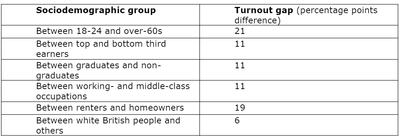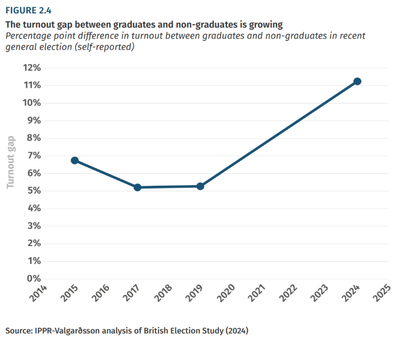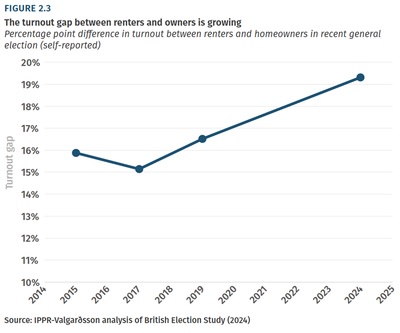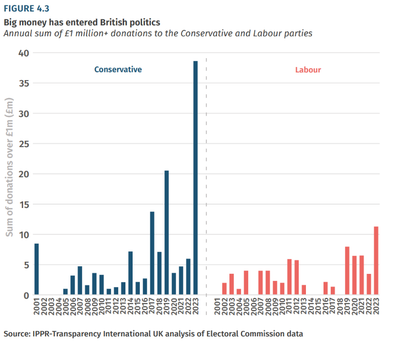Revealed: graduate turnout divide doubled in 2024 election, exposing government ‘blind spot’, IPPR warns
2 Jan 2025Press Story
- Turnout disparity between graduates and non-graduates was 11 percentage points, twice as high as 2019, and gap between homeowners and renters rose to 21 points, report finds
- Call for £100,000 cap on political donations and clampdown on foreign funders, as mega-donors' gifts over £1 million soared before election
- New election law needed to tackle rising voting inequalities and low turnout, or risk fueling distrust and populism, says IPPR
- Other proposed changes include automatic voter registration and a new civic duty to help at polling stations, akin to jury service
The turnout gap between graduates and non-graduates has more than doubled to 11 percentage points since 2019, a new study by IPPR reveals today.
Detailed analysis of voter turnout in the four general elections since 2015 has exposed a significant widening of the turnout gap, particularly between graduates and non-graduates but also between homeowners and renters.
While voting inequalities across age and income have broadly remained the same, IPPR finds that the turnout gap between those who own their home and those who rent grew by nearly a quarter, to 19 percentage points, between the general elections of 2017 and 2024.
The think tank highlights a critical “blind spot” in the government’s current approach to combating populism. Unless ministers actively work to make democracy more inclusive, populist movements will continue to gain traction, even if the economy is doing well, the report warns.
Findings released by IPPR earlier this year revealed that only one in every two adults in the UK voted in this year’s general election – the lowest share of the population to vote in a general election since universal suffrage.
IPPR is urging the introduction of an Elections Bill to address growing voting inequalities and revitalise democratic participation. Among its key proposals is a cap on individual and corporate donations to political parties at £100,000 per year.
In 2023, there were more donations over £1 million than ever before. Before 2017, such donations never totalled £10m to a single party in a year — but since then, that mark has been passed four times. In 2023, £1 million-plus donations to the two main UK parties totalled close to £50 million, of which almost £39 million was given to the Conservatives, and just over £11 million to the Labour party.
IPPR’s proposal comes amid reports that the US billionaire Elon Musk is considering donating £79m to Nigel Farage’s Reform Party.
It calls for the rules to be significantly tightened around shell companies and 'unincorporated associations', which it says can easily be used to channel illegitimate or foreign funding into UK politics. It calls for ‘due diligence checks’ to establish the true origin of any funds channeled to political parties this way.
The report proposes that no person or business who enters into a contract with a UK government department or agency should be allowed to donate to a political party or candidate.
The report also suggests the government considers other options for modernising elections, including:
Removing barriers to voting by:
- Linking up with DVLA, DWP, Passport Office to prompt voter registration, or using National Insurance Numbers to register people automatically when they turn 16
- Moving polling day to a weekend, as in Australia and New Zealand, or make election day a new public holiday
- Allowing a wider range of photo IDs, or scrapping ID requirements altogether
- Including the 5 million long-term tax-paying residents who aren’t citizens of the UK, Ireland, or Commonwealth nations
Increasing the ‘value’ of voting by:
- Limiting individual and corporate donations to political parties to £100,000 per year
- Expanding the Electoral Commission’s powers, with fines up to £500,000 or 4 per cent of campaign spending, the ability to share information with regulators, investigate candidate rule-breaking and impose sanctions
- Basing constituency boundaries on the entire adult population of an area, not just registered voters
Fostering a culture of democratic participation by:
- Lowering the voting age to 16
- Making citizenship education compulsory in schools
- Recruiting election-day poll workers from the population by lot, similarly, to recruiting for jury service
Dr Parth Patel, IPPR associate director of democracy and politics, said:
“We are close to the tipping point at which elections begin to lose legitimacy because the majority do not take part. That should be ringing more alarm bells than it is. We all know that elections aren’t perfect, but they are the only opportunity we get to express a desired future for ourselves and our country as a whole.
“So many people today feel alienated from organised politics. The government may overlook non-voters, but populists don’t. Government can and should look to bring people back into democracy. Capping big money donations, automatically registering voters and creating a new civic duty to staff polling stations will help get voters back.”
Dr Ryan Swift, IPPR research fellow, said:
“The widening turnout gaps between renters and homeowners, and graduates and non-graduates, highlight a glaring blind spot in tackling political inequality.
“To rebuild trust and strengthen democracy, we need bold reforms like votes at 16, automatic registration, and fairer electoral rules.”
Harry Quilter-Pinner, IPPR interim executive director, said:
“Political donations have doubled in UK in real terms since 2000, and even more concerning is the recent huge increase in ‘mega-donors’ giving more than £1 million to one party in a year.
“This undermines trust in democracy and makes people feel their vote doesn’t count. No one person should be able to give more than £100,000 a year to a political party, to lower the risk that the concentration of highly wealthy individuals or big business skewed our political system.”
ENDS
CONTACT
David Wastell, Director of News and Communications: 07921 403651 d.wastell@ippr.org
Liam Evans, Senior Digital and Media Officer: 07419 365334 l.evans@ippr.org
NOTES TO EDITORS
1. The IPPR paper, Modernising elections: How to get voters back by Dr Parth Patel and Dr Ryan Swift, will be published here: https://www.ippr.org/articles/...
2. Turnout gaps at the 2024 general election. Based on IPPR analysis of data from the British Election Study.

3. Trends in turnout gaps between graduates and non-graduates, and between renters and owners.



4. BIG MONEY HAS ENTERED BRITISH POLITICS
